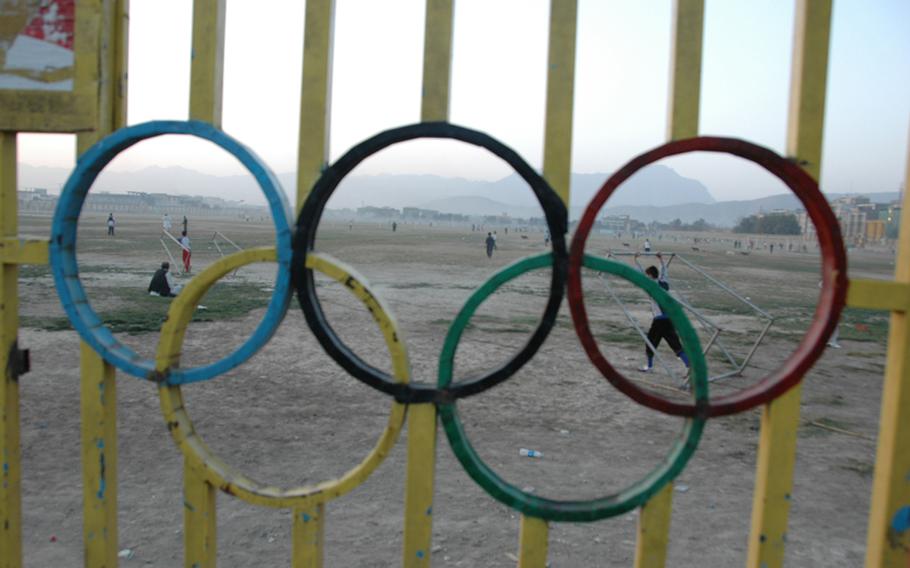
Chaman-i-Huzuri park in Kabul is where Afghan rugby players are honing their skills in the hope of representing their country at the 2016 Olympic Games. (Seth Robson/Stars and Stripes)
KABUL — The rugby posts at Kabul’s Chaman-i-Huzuri Park make it obvious to any passing player or fan that their sport has a home in the Afghan capital.
Players from Kabul United Rugby Club can be spotted running, passing, kicking and tackling at the park most mornings as they hone their skills in preparation for games against a dozen other rugby clubs formed here over the past two years.
Here, among the detritus of war, Afghan athletes can find a positive outlet for the energies, some fulfilling the dream of representing their nation on the world stage.
To a foreign observer the Afghan players look like ruggers from anywhere in the world — big, tough men who don’t mind the cuts and bruises that come with contact sport. A key difference — training at the crack of dawn, made easier by the fact that alcohol is banned in the country, though it can be had in the capital.
The Kabul players have been putting in extra time at practice lately. Many are members of the Afghan national team, which is preparing for a tour to India in October. They played in Pakistan in 2011 and Dubai earlier this year.
Afghanistan’s national rugby team captain and hooker, Sayed Mustafa, 24, of Helmand province, is big for an Afghan, standing over 6 feet tall and weighing in at 200 pounds.
Before he played rugby, Mustafa tried his hand at soccer, kickboxing and the Afghan sport of Buzkashi — a game of unwritten rules that nobody follows, in which horsemen battle over a headless goat carcass.
“Buzkashi is a tough sport because you can fall from your horse and the goat is heavy,” he said, after barging through several tackles to score in a practice game.
The players aren’t quite as modest as some of their compatriots in Kabul who frown on men wearing shorts in the street. One Afghan, Bari Gazang, played barefoot and stripped off his T-shirt, which was ripped apart by tacklers. Afghan Rugby Federation director Abdul Khalil Bik said some of the players can’t afford shoes.
He said that poor security in some provinces holds back community development but that things are getting better.
“Sport is a very strong tool to help a community, country or individual grow,” he said. “This is something which Afghanistan needs.”
The exploits of the Afghan cricket team, which has been playing against the best international sides in the World Twenty20 tournament in India this month, have been great for Afghanistan, he said.
Pashtuns were so excited when Afghan Taekwondo athlete Rohullah Nikpai won the bronze medal at the London Olympics that they got up and launched into the traditional “atan” dance to celebrate, Bik said.
“We (the Afghan Rugby Federation) hope to create more heroes … so that our next and present generation can have people to look forward to and focus their mind on positives and kick out the negatives,” he said.
Canadian Army Master Cpl. Paul Charles, 25, who works for the International Security Assistance Force in Afghanistan, said military personnel from South Africa, Tonga, Fiji, Britain, the U.S., Canada, France, New Zealand and Australia also play rugby in Kabul.
Charles, a Prince Edward Island Mudmen rugby player, said the foreign players have been helping the Afghans prepare for their India tour.
“I have seen them play and they have a lot of potential,” he said. “They’re just lacking experience and they need funding because it is a new program.”
Mujeebullah Rahmani, a spokesman for the Afghan Olympic Committee, said his organization is funding the construction of facilities in 20 provinces so that athletes have places to compete in various sports. The committee is still considering at how it can support athletes who hope to compete in the 2016 Olympics, he said.
Zubair Babakarkhail contributed to this report.